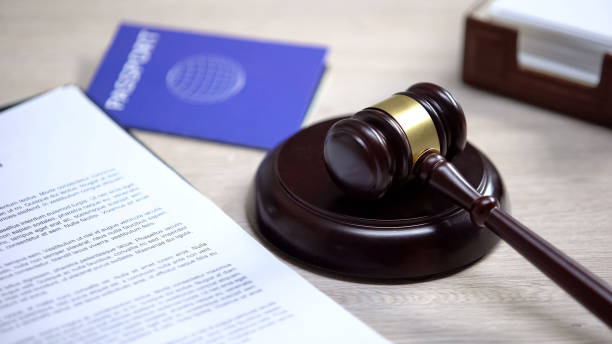Introduction
Traveling abroad is an exciting opportunity to explore new cultures, enjoy breathtaking destinations, and create lasting memories. However, navigating foreign lands also requires a solid understanding of international regulations, cultural norms, and local laws to ensure your safety and well-being. The last thing any traveler wants is to find themselves embroiled in legal trouble while abroad. From respecting local customs to securing essential documents, there are many steps you can take to avoid legal issues when traveling.

This comprehensive traveler’s checklist will guide you through the essential precautions and considerations to avoid legal complications while abroad. Whether you’re embarking on a short vacation or an extended stay, staying informed and prepared is the best way to ensure smooth travels.
Understanding International Travel Laws
Before setting foot in a foreign country, it’s crucial to familiarize yourself with the legal systems and regulations of your destination. Every country has its own set of laws, and what might be acceptable behavior in your home country could be illegal in another. Therefore, having a general understanding of international travel laws and local regulations is the first step in avoiding legal risks abroad.
Start by researching the laws regarding customs, alcohol consumption, public behavior, and other legal concerns that might affect your trip. Be mindful of any travel advisories issued by your government, as they provide vital information on areas with heightened risks or potential legal challenges.
Customs Regulations and Border Crossing
One of the most common areas where travelers encounter legal trouble is at the border. Each country has specific customs regulations regarding what you can bring into the country, including restricted items like certain food products, medicines, or electronics. To avoid any issues, make sure you understand the customs regulations of your destination and avoid bringing anything that might raise suspicion or cause problems at immigration checkpoints.
Always declare any items that may require special permission, and keep the documentation handy to prove the legitimacy of any goods you’re carrying.
Visas and Permits: Know Your Entry Requirements
Most countries require travelers to obtain a visa or entry permit before arrival. A visa is an official document that grants permission to enter a country for a specific period. Failure to comply with visa requirements could result in fines, deportation, or even a ban on future visits.
Before booking your trip, research the visa requirements for your destination and make sure to apply in advance. Some countries may also require additional permits or documentation, such as health certificates, travel insurance, or proof of sufficient funds.
Understanding Foreign Law Enforcement
While abroad, you may encounter local law enforcement. Foreign police officers have the authority to detain and question individuals suspected of breaking the law. Knowing how foreign law enforcement systems work can help you avoid misunderstandings and legal issues during your travels.
Make sure you know the emergency contact numbers for police or other authorities in the country you’re visiting. In the event of an issue with local law enforcement, contact your embassy or consulate immediately for assistance.
Travel Insurance: Your Safety Net
Travel insurance is one of the best ways to protect yourself from unexpected legal or medical issues while abroad. A comprehensive travel insurance policy covers everything from lost luggage to emergency medical care and even legal expenses in case you get into trouble with the law.
When purchasing travel insurance, make sure it includes coverage for any potential legal issues, such as bail fees, legal representation, and emergency evacuations if necessary.
Criminal Offenses Abroad: Avoiding Legal Violations
Criminal laws vary from country to country, and offenses that might seem minor at home could carry severe penalties abroad. Always be aware of local laws, especially those related to drinking alcohol, drug use, and public behavior. Many countries have strict laws against activities that may seem harmless, such as smoking in public places, jaywalking, or public intoxication.
For example, some countries have zero-tolerance policies for drug use, and penalties can include imprisonment, heavy fines, or even the death penalty in extreme cases. Always stay informed about the local criminal laws and avoid engaging in any activities that could put you at risk.
Cultural Sensitivity: Respecting Local Customs and Traditions
Cultural sensitivity is essential when traveling abroad. Each country has its own set of social norms and traditions, and failure to respect these customs can lead to misunderstandings, legal consequences, or even cultural offenses.
Before traveling, take time to learn about the cultural norms of your destination. This might include dress codes, greetings, social behaviors, and other practices that are considered respectful or disrespectful. For example, some countries have strict rules regarding public behavior, such as modest dress or limits on public displays of affection.
Document Security: Protecting Your Travel Papers
Keeping your important documents secure is a vital part of your travel preparation. Passport theft or loss can be a nightmare for travelers, and in some countries, losing your passport can lead to complications with immigration, legal troubles, or extended delays.
Keep your passport and other critical documents (such as visas, tickets, and travel insurance) in a safe place, preferably in a hotel safe or money belt. If you do lose your passport or other documents, report the loss to the local authorities and your embassy as soon as possible.
Dispute Resolution and Embassy Assistance
If you do find yourself in a legal dispute while abroad, your first point of contact should be your country’s embassy or consulate. They can offer legal advice, provide emergency assistance, and help resolve any disputes with local authorities.
Embassies are also valuable resources for travelers who find themselves in difficult situations, such as arrests, accidents, or other emergencies. Make sure to keep your embassy’s contact information readily available throughout your travels.
Avoiding Travel Scams: Protecting Yourself from Fraud
Travel scams are a common issue that can lead to legal and financial trouble while abroad. Scammers often target unsuspecting travelers with fraudulent offers, such as fake tours, counterfeit currency exchanges, or even stolen personal information.
To avoid falling victim to a scam, always research the services and companies you use while traveling. Be cautious when dealing with unfamiliar individuals or businesses, and if an offer sounds too good to be true, it probably is.
Conclusion: Stay Informed, Stay Safe
Traveling abroad can be an enriching experience, but it’s important to stay informed and prepared to avoid potential legal trouble. By understanding international laws, respecting local customs, securing your documents, and protecting yourself with travel insurance, you can minimize the risks associated with overseas travel.
Remember, the key to a successful trip is planning and awareness. The more prepared you are, the more enjoyable and hassle-free your travels will be. Stay safe, respect the local culture, and enjoy your journey with confidence.
